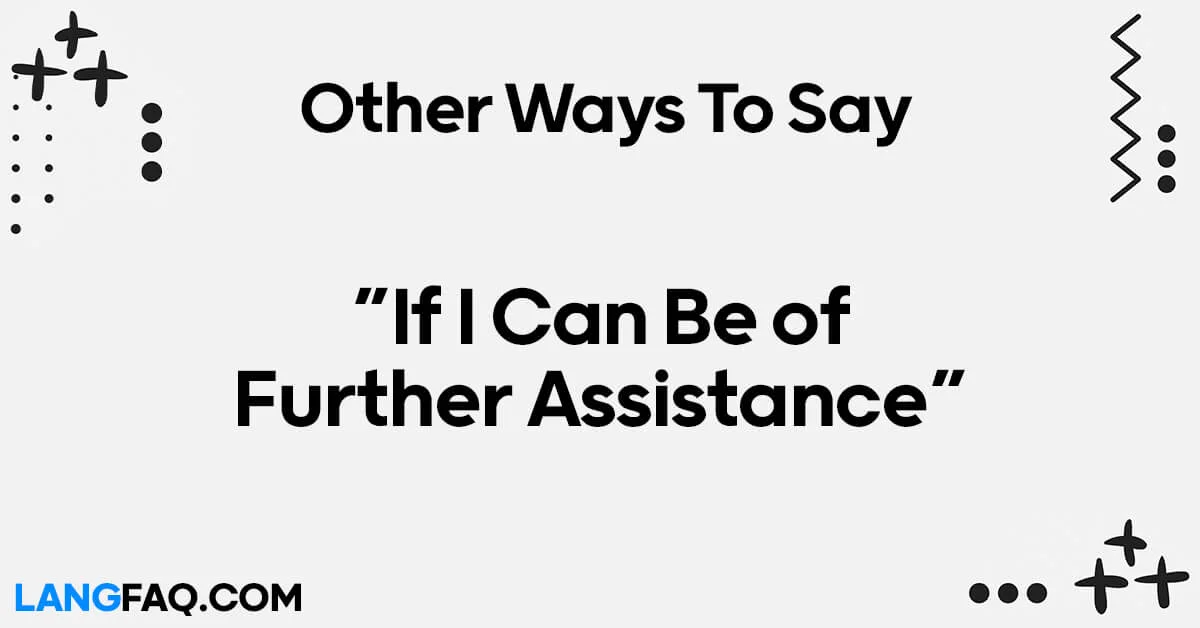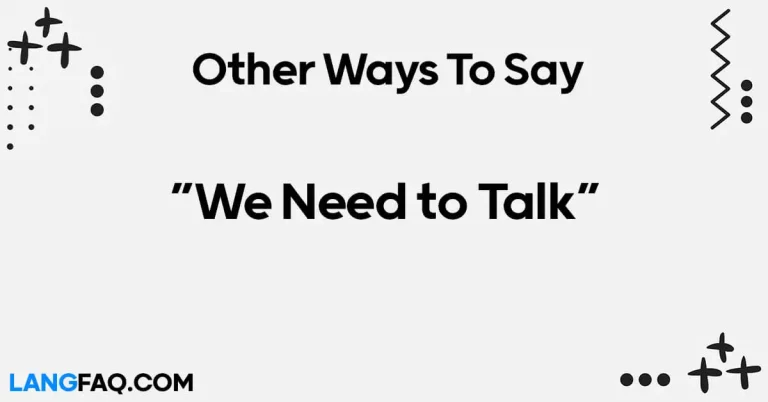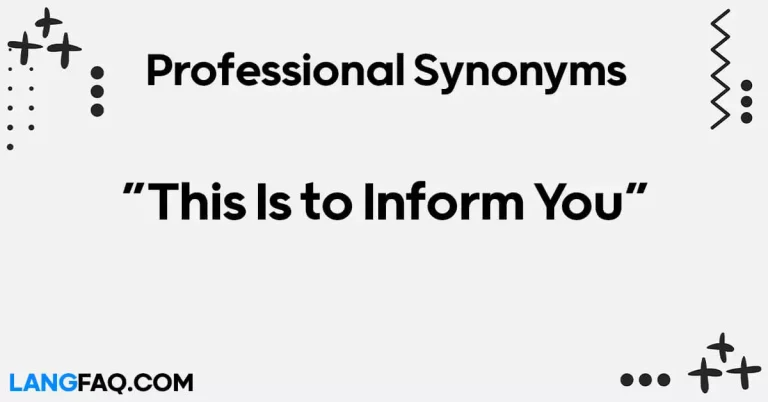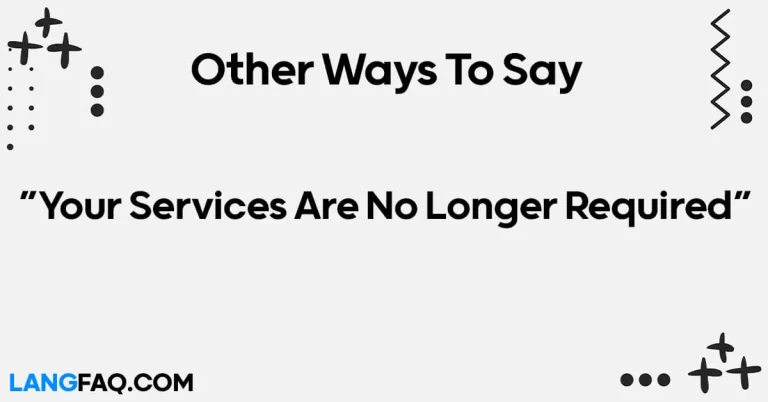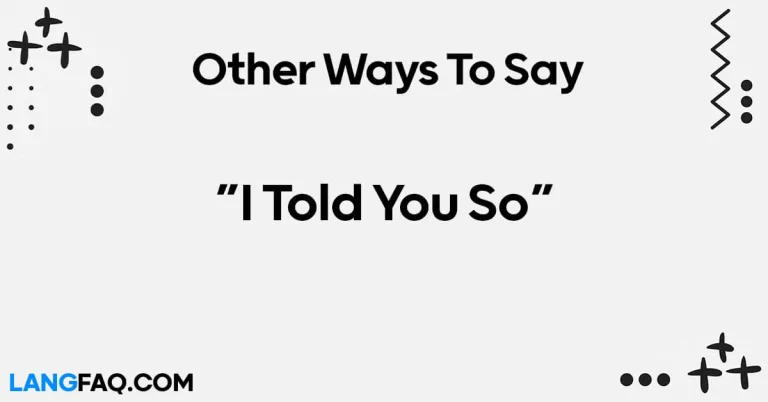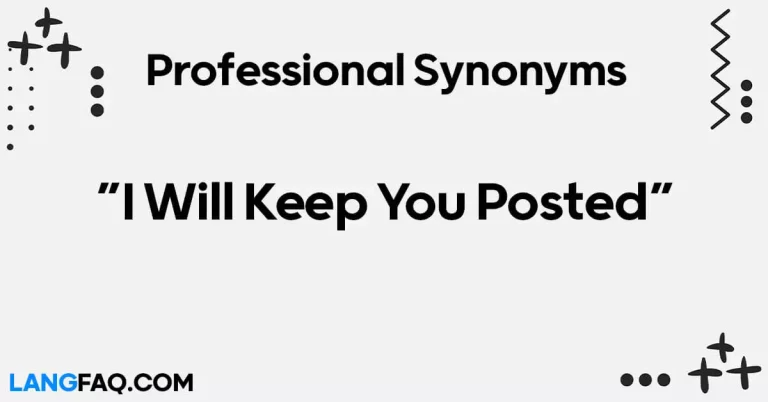In the realm of effective communication, versatility is key. When it comes to expressing willingness to help, phrases like “If I Can Be of Further Assistance” play a crucial role. However, diversifying your vocabulary can add depth and nuance to your interactions. In this article, we’ll explore twelve dynamic alternatives to “If I Can Be of Further Assistance,” providing you with a plethora of options to enrich your conversations and interactions.
12 Other Ways to Say “If I Can Be of Further Assistance”
Here are 12 alternative ways to express “If I Can Be of Further Assistance”:
- Should you require any more help, feel free to ask.
- Let me know if there’s anything else I can assist you with.
- If there’s anything further you need support with, just give me a shout.
- I’m here to lend a hand with anything else you might need.
- Don’t hesitate to reach out if there’s anything more I can do for you.
- Should you need additional assistance, I’m just a message away.
- Feel free to get in touch if there’s anything else on your mind.
- If there’s anything else I can help you with, please don’t hesitate to reach out.
- Should you require further assistance or have any other questions, let me know.
- I’m at your disposal for any further assistance you may require.
- If there’s anything else I can do to support you, I’m here.
- Feel free to reach out if you need any more assistance or information.
Here’s the table along with a short conclusion:
| Phrase | Meaning | Example |
|---|---|---|
| Should you require any more help | Indicates readiness to offer additional assistance | “Should you require any more help, I’m here for you.” |
| Let me know if there’s anything else I can assist you with | Offers further assistance or support | “Let me know if there’s anything else I can assist you with.” |
| If there’s anything further you need support with | Expresses willingness to provide additional help | “If there’s anything further you need support with, just let me know.” |
| I’m here to lend a hand with anything else you might need | Offers assistance with any additional needs or queries | “I’m here to lend a hand with anything else you might need.” |
| Don’t hesitate to reach out if there’s anything more I can do for you | Encourages communication for additional support or assistance | “Don’t hesitate to reach out if there’s anything more I can do for you.” |
| Should you need additional assistance, I’m just a message away | Offers availability for further help via communication channels | “Should you need additional assistance, I’m just a message away.” |
| Feel free to get in touch if there’s anything else on your mind | Invites communication for addressing additional concerns | “Feel free to get in touch if there’s anything else on your mind.” |
| If there’s anything else I can help you with, please don’t hesitate to reach out | Expresses readiness to assist with any additional needs | “If there’s anything else I can help you with, please don’t hesitate to reach out.” |
| Should you require further assistance or have any other questions | Indicates willingness to provide further help or clarification | “Should you require further assistance or have any other questions, feel free to ask.” |
| I’m at your disposal for any further assistance you may require | Offers availability for providing additional assistance | “I’m at your disposal for any further assistance you may require.” |
| If there’s anything else I can do to support you, I’m here | Expresses willingness to offer ongoing support | “If there’s anything else I can do to support you, I’m here.” |
| Feel free to reach out if you need any more assistance or information | Invites communication for addressing additional needs or queries | “Feel free to reach out if you need any more assistance or information.” |
Expanding your vocabulary with alternative phrases for offering assistance enhances communication and fosters stronger connections. These expressions convey availability, willingness to help, and readiness to support others effectively.
Is It Correct to Say “If I Can Be of Further Assistance”?
Yes, “If I can be of further assistance” is a correct and commonly used phrase in English. It is a polite and formal way to offer additional help or support to someone. This phrase is often used in professional settings, customer service interactions, or business communications to convey willingness to assist further if needed.
Professional Mail Example With “If I Can Be of Further Assistance”
Subject: Assistance Offered for Your Recent Inquiry
Dear [Recipient’s Name],
I hope this email finds you well.
I wanted to follow up on our recent correspondence regarding [specific topic/issue]. I trust that the information provided was helpful in addressing your query.
However, please know that if you require any further assistance or have additional questions, I am here to help. Your satisfaction and understanding are of utmost importance to us, and I am committed to ensuring that all your needs are met to the best of my ability.
Please feel free to reach out at any time if there is anything else I can assist you with. Your feedback and inquiries are always welcome.
Thank you once again for reaching out, and I look forward to hearing from you soon.
Best regards,
[Your Name] [Your Position/Title] [Your Contact Information]
Should You Require Any More Help
When it comes to extending assistance, the phrase “Should you require any more help” exudes professionalism and willingness to go the extra mile. It’s a formal and polite way to offer continued support to someone who may need further assistance. This phrase is suitable for professional contexts such as business emails, client interactions, or customer service communications.
Scenario:
Imagine you’ve just concluded a meeting with a client where you’ve addressed their initial concerns. You want to assure them that you’re available for any additional support they might need. In this scenario, you might use the phrase “Should you require any more help” to express your readiness to assist further.
Example Sentence: “Thank you for meeting with us today. Should you require any more help with the project, please don’t hesitate to reach out.”
Email Sample:
Subject: Follow-up Support Available
Dear [Client’s Name],
I hope this email finds you well. Thank you for the productive meeting earlier today. It was great discussing [specific topic/project].
I wanted to take this opportunity to remind you that should you require any more help or have further questions as we move forward with the project, please don’t hesitate to reach out. I’m here to assist you every step of the way.
Looking forward to our continued collaboration.
Best regards, [Your Name]
Variations:
- For colleagues: “If you need any more help with the task, feel free to let me know.”
- For friends: “If there’s anything else I can do to support you, just give me a shout.”
Dictionary Insights:
The phrase “should you require” is a formal way of expressing possibility or potential need. It demonstrates a level of politeness and professionalism in communication.
Usage Tips:
- Use this phrase in formal contexts such as business emails, client interactions, or professional correspondence.
- Maintain a polite and helpful tone to convey sincerity and willingness to assist further.
Pros:
- Conveys professionalism and readiness to assist.
- Maintains a polite tone in communication.
- Suitable for various professional settings.
Cons:
- May sound overly formal in casual or personal interactions.
- Could be perceived as slightly impersonal in certain contexts.
Related Grammar/Usage Rules:
- “Should” is used to express possibility or potential situations.
- “Require” is a formal way of saying “need” or “request.”
- The phrase is typically used in conditional sentences to offer assistance or support.
Let Me Know If There’s Anything Else I Can Assist You With
The phrase “Let me know if there’s anything else I can assist you with” is a versatile way to offer continued support or assistance in various contexts. It’s friendly, professional, and allows the recipient to reach out if they require further help. This phrase can be used in both formal and informal settings, making it suitable for professional emails, customer service interactions, or even conversations with friends.
Scenario:
You’ve just wrapped up a meeting with a colleague where you’ve discussed a project. As the meeting concludes, you want to ensure your colleague knows you’re available for any additional assistance they may need. You might use the phrase “Let me know if there’s anything else I can assist you with” to convey your readiness to help further.
Example Sentence: “Thanks for the productive meeting. Let me know if there’s anything else I can assist you with regarding the project.”
Email Sample:
Subject: Additional Support Available
Hi [Colleague’s Name],
I hope you’re doing well. It was great discussing the project with you earlier today. I’m glad we were able to address [specific topic/concern].
Just a quick note to let you know that if there’s anything else I can assist you with or if you have further questions about the project, please don’t hesitate to reach out. I’m here to support you every step of the way.
Looking forward to our continued collaboration.
Best regards, [Your Name]
Variations:
- For clients: “Let me know if there’s anything else I can help you with regarding your project.”
- For friends: “If there’s anything else I can assist you with, just give me a shout.”
Dictionary Insights:
The phrase “let me know” is an idiomatic expression used to invite communication or inform someone of your availability to help.
Usage Tips:
- Use this phrase in both formal and informal contexts to offer assistance or support.
- Keep the tone friendly and helpful to encourage open communication.
Pros:
- Versatile phrase suitable for various settings.
- Conveys availability and willingness to assist.
- Invites open communication and further discussion.
Cons:
- May sound slightly formal in casual or personal interactions.
- Could be perceived as generic if not accompanied by specific offers of assistance.
Related Grammar/Usage Rules:
- “Let me know” is a polite way of inviting communication or informing someone of your availability to help.
- “Anything else” emphasizes openness to additional requests or inquiries.
- “Assist you with” is a formal way of offering help or support.
If There’s Anything Further You Need Support With
The phrase “If there’s anything further you need support with” is a polite and formal way to offer continued assistance or help. It indicates a willingness to address any additional needs or concerns the recipient may have. This phrase is commonly used in professional contexts such as business communications, client interactions, or customer service interactions.
Scenario:
After providing initial support to a customer who has reached out with a query, you want to ensure they know you’re available to assist with any further issues or questions they may have. In this scenario, you might use the phrase “If there’s anything further you need support with” to convey your readiness to help further.
Example Sentence: “Thank you for contacting customer support. If there’s anything further you need support with, please don’t hesitate to let us know.”
Email Sample:
Subject: Further Assistance Available
Dear [Customer’s Name],
Thank you for reaching out to us with your query. We’re glad we could assist you with [specific issue].
Just a quick note to let you know that if there’s anything further you need support with or if you have any other questions, please don’t hesitate to reach out to us. Our team is here to help you every step of the way.
Looking forward to resolving any further queries you may have.
Best regards, [Your Name]
Variations:
- For colleagues: “If there’s anything further you need support with regarding the project, feel free to reach out.”
- For friends: “If there’s anything else you need support with, just give me a call.”
Dictionary Insights:
The word “further” emphasizes the continuation or extension of assistance beyond what has already been provided.
Usage Tips:
- Use this phrase in formal contexts to offer additional support or assistance.
- Maintain a professional tone to convey sincerity and readiness to help further.
Pros:
- Polite and formal way to offer continued assistance.
- Indicates availability and willingness to address further needs or concerns.
- Suitable for professional communications and customer service interactions.
Cons:
- May sound slightly formal in casual or personal interactions.
- Could be perceived as generic if not accompanied by specific offers of assistance.
Related Grammar/Usage Rules:
- “Further” is used to indicate additional or continued assistance beyond what has already been provided.
- “Need support with” is a formal way of offering help or assistance.
I’m Here to Lend a Hand with Anything Else You Might Need
The phrase “I’m here to lend a hand with anything else you might need” conveys a friendly and helpful tone while offering assistance or support. It expresses availability and willingness to help with any further needs or queries the recipient may have. This phrase is versatile and can be used in both formal and informal settings, making it suitable for professional communications, customer interactions, or conversations with friends.
Scenario:
You’ve just concluded a meeting with a colleague where you’ve discussed a project. As the meeting wraps up, you want to assure your colleague that you’re available to assist with any additional tasks or queries they may have. In this scenario, you might use the phrase “I’m here to lend a hand with anything else you might need” to convey your readiness to help further.
Example Sentence: “Thanks for the productive meeting. I’m here to lend a hand with anything else you might need regarding the project.”
Email Sample:
Subject: Additional Support Available
Hi [Colleague’s Name],
I hope you’re doing well. It was great discussing the project with you earlier today. I’m glad we were able to address [specific topic/concern].
Just wanted to let you know that I’m here to lend a hand with anything else you might need regarding the project. If you have any further tasks or questions, feel free to reach out to me. I’m more than happy to help.
Looking forward to our continued collaboration.
Best regards, [Your Name]
Variations:
- For clients: “I’m here to lend a hand with anything else you might need regarding your project. Feel free to reach out to me.”
- For friends: “I’m here to help with anything else you might need. Just let me know.”
Dictionary Insights:
The phrase “lend a hand” is an idiom meaning to offer assistance or help.
Usage Tips:
- Use this phrase in both formal and informal contexts to offer assistance or support.
- Keep the tone friendly and helpful to convey sincerity and willingness to help further.
Pros:
- Friendly and helpful way to offer assistance.
- Conveys availability and willingness to help with any further needs or queries.
- Suitable for various settings, including professional communications and personal interactions.
Cons:
- May sound slightly informal in very formal or professional contexts.
- Could be perceived as generic if not accompanied by specific offers of assistance.
Related Grammar/Usage Rules:
- “Lend a hand” is an idiom meaning to offer assistance or help.
- “Anything else you might need” emphasizes openness to additional tasks or queries.
- “I’m here to” indicates availability and willingness to assist.
Don’t Hesitate to Reach Out If There’s Anything More I Can Do for You
The phrase “Don’t hesitate to reach out if there’s anything more I can do for you” is a courteous and supportive way to offer further assistance or help. It encourages open communication and assures the recipient that you’re available to assist with any additional needs or concerns they may have. This phrase is commonly used in professional communications, customer service interactions, or even conversations with friends.
Scenario:
After providing initial support to a customer who has reached out with a query, you want to ensure they know you’re available for any additional assistance they may require. In this scenario, you might use the phrase “Don’t hesitate to reach out if there’s anything more I can do for you” to convey your readiness to help further.
Example Sentence: “Thank you for contacting customer support. Don’t hesitate to reach out if there’s anything more I can do for you.”
Email Sample:
Subject: Additional Assistance Available
Dear [Customer’s Name],
Thank you for reaching out to us with your query. We’re glad we could assist you with [specific issue].
I wanted to follow up and remind you that if there’s anything more I can do for you or if you have any further questions, please don’t hesitate to reach out. Our team is here to support you and ensure your satisfaction.
Looking forward to assisting you further.
Best regards, [Your Name]
Variations:
- For colleagues: “Don’t hesitate to reach out if there’s anything more I can do for you regarding the project.”
- For friends: “If there’s anything more I can do for you, don’t hesitate to reach out.”
Dictionary Insights:
The phrase “don’t hesitate to” is an idiomatic expression used to encourage action or communication without delay or reservation.
Usage Tips:
- Use this phrase in both formal and informal contexts to offer further assistance or help.
- Maintain a courteous and supportive tone to convey availability and willingness to assist further.
Pros:
- Courteous and supportive way to offer further assistance.
- Encourages open communication and ensures the recipient knows help is available.
- Suitable for various settings, including professional communications and personal interactions.
Cons:
- May sound slightly formal in very casual or personal interactions.
- Could be perceived as generic if not accompanied by specific offers of assistance.
Related Grammar/Usage Rules:
- “Don’t hesitate to” is an idiomatic expression used to encourage action or communication without delay or reservation.
- “Anything more I can do for you” emphasizes willingness to provide additional assistance or support.
Should You Need Additional Assistance, I’m Just a Message Away
The phrase “Should you need additional assistance, I’m just a message away” conveys accessibility and availability to provide further help or support. It offers a convenient means of communication and assures the recipient that assistance is readily available if needed. This phrase is suitable for various contexts, including professional communications, client interactions, or even conversations with friends.
Scenario:
After concluding a meeting with a colleague where you’ve discussed a project, you want to ensure they know you’re available for any additional assistance they may require. In this scenario, you might use the phrase “Should you need additional assistance, I’m just a message away” to convey your accessibility and willingness to help further.
Example Sentence: “Thanks for the productive meeting. Should you need additional assistance, I’m just a message away.”
Email Sample:
Subject: Accessibility for Further Assistance
Hi [Colleague’s Name],
I hope you found our meeting productive. I’m glad we were able to discuss [specific topic/project].
Just wanted to drop you a quick note to let you know that should you need additional assistance or have any further questions about the project, I’m just a message away. Feel free to reach out to me anytime, and I’ll be more than happy to help.
Looking forward to our continued collaboration.
Best regards, [Your Name]
Variations:
- For clients: “Should you need additional assistance with your project, I’m just a message away.”
- For friends: “If you need additional assistance with anything, just shoot me a message.”
Dictionary Insights:
The phrase “just a message away” emphasizes accessibility and availability for communication and assistance.
Usage Tips:
- Use this phrase to convey accessibility and willingness to provide further assistance or support.
- Offer a convenient means of communication, such as email or messaging platforms, to ensure easy access to assistance.
Pros:
- Conveys accessibility and availability for further assistance.
- Offers a convenient means of communication for reaching out.
- Suitable for various contexts, including professional communications and personal interactions.
Cons:
- May sound slightly formal in very casual or personal interactions.
- Could be perceived as generic if not accompanied by specific offers of assistance.
Related Grammar/Usage Rules:
- “Should you need” is a formal way of expressing potential need or requirement.
- “Just a message away” emphasizes accessibility and availability for communication and assistance.
Feel Free to Get in Touch If There’s Anything Else on Your Mind
The phrase “Feel free to get in touch if there’s anything else on your mind” invites open communication and assures the recipient that their thoughts or concerns are valued. It encourages them to reach out if they have any additional questions, needs, or ideas they’d like to discuss. This phrase is friendly, approachable, and suitable for various contexts, including professional communications, client interactions, or even conversations with friends.
Scenario:
After a productive discussion with a client, you want to ensure they know you’re receptive to any further thoughts or questions they may have. In this scenario, you might use the phrase “Feel free to get in touch if there’s anything else on your mind” to convey your openness to further communication and dialogue.
Example Sentence: “Thank you for the insightful discussion. Feel free to get in touch if there’s anything else on your mind.”
Email Sample:
Subject: Open Invitation for Further Discussion
Dear [Client’s Name],
I wanted to thank you for the engaging discussion we had earlier. Your insights were truly valuable.
I also wanted to extend an open invitation for further discussion. Feel free to get in touch if there’s anything else on your mind or if you have any additional questions or ideas you’d like to explore together. I’m here to support you and address any further needs or concerns you may have.
Looking forward to continuing our collaboration and exploring new opportunities together.
Best regards, [Your Name]
Variations:
- For colleagues: “Feel free to get in touch if there’s anything else on your mind regarding the project.”
- For friends: “If there’s anything else on your mind you’d like to chat about, just give me a call.”
Dictionary Insights:
The phrase “on your mind” refers to thoughts or concerns that someone is currently thinking about or considering.
Usage Tips:
- Use this phrase to invite open communication and assure the recipient that their thoughts or concerns are valued.
- Maintain a friendly and approachable tone to encourage further dialogue and discussion.
Pros:
- Invites open communication and dialogue.
- Assures the recipient that their thoughts or concerns are valued.
- Suitable for various contexts, including professional communications and personal interactions.
Cons:
- May sound slightly formal in very casual or personal interactions.
- Could be perceived as generic if not accompanied by specific offers of further discussion or assistance.
Related Grammar/Usage Rules:
- “Feel free to” is an idiomatic expression used to encourage action or communication without hesitation or restraint.
- “Anything else on your mind” refers to thoughts or concerns that someone is currently thinking about or considering.
If There’s Anything Else I Can Help You With, Please Don’t Hesitate to Reach Out
The phrase “If there’s anything else I can help you with, please don’t hesitate to reach out” is a courteous and supportive way to offer further assistance or help. It assures the recipient that you’re available to assist with any additional needs or questions they may have. This phrase is commonly used in professional communications, customer service interactions, or even conversations with friends.
Scenario:
After providing initial support to a customer who has reached out with a query, you want to ensure they know you’re available for any additional assistance they may require. In this scenario, you might use the phrase “If there’s anything else I can help you with, please don’t hesitate to reach out” to convey your availability and willingness to help further.
Example Sentence: “Thank you for contacting customer support. If there’s anything else I can help you with, please don’t hesitate to reach out.”
Email Sample:
Subject: Continued Support Available
Dear [Customer’s Name],
Thank you for reaching out to us with your query. We’re glad we could assist you with [specific issue].
I wanted to follow up and remind you that if there’s anything else I can help you with or if you have any further questions, please don’t hesitate to reach out. Our team is here to support you and ensure your satisfaction.
Looking forward to assisting you further.
Best regards, [Your Name]
Variations:
- For colleagues: “If there’s anything else I can help you with regarding the project, please don’t hesitate to reach out.”
- For friends: “If there’s anything else I can help you with, just let me know.”
Dictionary Insights:
The phrase “don’t hesitate to” is an idiomatic expression used to encourage action or communication without delay or reservation.
Usage Tips:
- Use this phrase in both formal and informal contexts to offer further assistance or help.
- Maintain a courteous and supportive tone to convey availability and willingness to assist further.
Pros:
- Courteous and supportive way to offer further assistance.
- Assures the recipient that help is available for any additional needs or questions.
- Suitable for various contexts, including professional communications and personal interactions.
Cons:
- May sound slightly formal in very casual or personal interactions.
- Could be perceived as generic if not accompanied by specific offers of assistance.
Related Grammar/Usage Rules:
- “Don’t hesitate to” is an idiomatic expression used to encourage action or communication without delay or reservation.
- “Anything else I can help you with” emphasizes willingness to provide additional assistance or support.
Should You Require Further Assistance or Have Any Other Questions, Let Me Know
The phrase “Should you require further assistance or have any other questions, let me know” is a formal and polite way to offer additional support or clarification. It demonstrates readiness to address any further needs or inquiries the recipient may have. This phrase is commonly used in professional communications, business emails, or client interactions.
Scenario:
After providing initial assistance to a colleague who has reached out with a query, you want to ensure they know you’re available for any further support or clarification they may need. In this scenario, you might use the phrase “Should you require further assistance or have any other questions, let me know” to convey your readiness to help further.
Example Sentence: “Thank you for reaching out. Should you require further assistance or have any other questions, let me know.”
Email Sample:
Subject: Additional Support Offered
Hi [Colleague’s Name],
Thank you for reaching out with your question. I’m glad I could assist you with [specific issue].
Should you require further assistance or have any other questions as you continue with the project, please don’t hesitate to let me know. I’m here to support you and ensure your success.
Looking forward to assisting you further.
Best regards, [Your Name]
Variations:
- For clients: “If you require further assistance or have any other questions regarding your project, please let me know.”
- For friends: “If you have any other questions or need further assistance, just give me a shout.”
Dictionary Insights:
The phrase “let me know” is an idiomatic expression used to invite communication or inform someone of your availability to help.
Usage Tips:
- Use this phrase in formal contexts to offer additional support or clarification.
- Maintain a polite and helpful tone to convey readiness to assist further.
Pros:
- Formal and polite way to offer further assistance or clarification.
- Demonstrates readiness to address any further needs or inquiries.
- Suitable for professional communications and business interactions.
Cons:
- May sound slightly formal in very casual or personal interactions.
- Could be perceived as generic if not accompanied by specific offers of assistance or clarification.
Related Grammar/Usage Rules:
- “Should you require” is a formal way of expressing potential need or requirement.
- “Let me know” is a polite way of inviting communication or informing someone of your availability to help.
I’m at Your Disposal for Any Further Assistance You May Require
The phrase “I’m at your disposal for any further assistance you may require” conveys availability and willingness to provide further help or support. It assures the recipient that assistance is readily available if needed. This phrase is formal and can be used in various professional contexts, including business communications, client interactions, or customer service interactions.
Scenario:
After concluding a meeting with a client where you’ve addressed their initial concerns, you want to ensure they know you’re available for any additional assistance they may require. In this scenario, you might use the phrase “I’m at your disposal for any further assistance you may require” to convey your availability and willingness to help further.
Example Sentence: “Thank you for meeting with us today. I’m at your disposal for any further assistance you may require.”
Email Sample:
Subject: Continued Support Available
Dear [Client’s Name],
Thank you for meeting with us today. It was a pleasure discussing [specific topic/project] with you.
I wanted to take this opportunity to assure you that I’m at your disposal for any further assistance you may require as we move forward with the project. If you have any additional questions or need further support, please don’t hesitate to reach out. I’m here to help ensure the success of our project.
Looking forward to our continued collaboration.
Best regards, [Your Name]
Variations:
- For colleagues: “I’m at your disposal for any further assistance you may require regarding the project.”
- For friends: “If you need any further assistance, just let me know. I’m here to help.”
Dictionary Insights:
The phrase “at your disposal” means available for use or assistance as needed.
Usage Tips:
- Use this phrase in formal contexts to convey availability and willingness to assist further.
- Maintain a professional tone to convey sincerity and readiness to help.
Pros:
- Conveys availability and willingness to provide further assistance.
- Assures the recipient that help is readily available if needed.
- Suitable for various professional settings, including business communications and client interactions.
Cons:
- May sound slightly formal in very casual or personal interactions.
- Could be perceived as slightly impersonal in certain contexts.
Related Grammar/Usage Rules:
- “At your disposal” means available for use or assistance as needed.
- “For any further assistance you may require” emphasizes readiness to provide additional help or support.
In Case You Need Any Further Help, Feel Free to Reach Out
The phrase “In case you need any further help, feel free to reach out” is a friendly and supportive way to offer assistance or support. It encourages open communication and assures the recipient that help is available if needed. This phrase is suitable for both formal and informal contexts, making it versatile for various situations, including professional communications, client interactions, or conversations with friends.
Scenario:
After providing initial support to a colleague who has reached out with a question, you want to ensure they know you’re available for any additional assistance they may require. In this scenario, you might use the phrase “In case you need any further help, feel free to reach out” to convey your willingness to assist further.
Example Sentence: “Thank you for reaching out. In case you need any further help, feel free to reach out.”
Email Sample:
Subject: Continued Support Offered
Hi [Colleague’s Name],
Thank you for reaching out with your question. I’m glad I could assist you with [specific issue].
Just wanted to let you know that in case you need any further help or have any other questions as you work on the project, feel free to reach out to me. I’m here to support you and ensure your success.
Looking forward to assisting you further.
Best regards, [Your Name]
Variations:
- For clients: “If you need any further help or have any other questions regarding your project, feel free to reach out.”
- For friends: “If you need any further help with anything, just give me a call.”
Dictionary Insights:
The phrase “in case” is used to express the possibility of something happening or being needed.
Usage Tips:
- Use this phrase to encourage open communication and assure the recipient that help is available if needed.
- Maintain a friendly and supportive tone to convey willingness to assist further.
Pros:
- Friendly and supportive way to offer assistance.
- Encourages open communication and ensures the recipient knows help is available.
- Suitable for various contexts, including professional communications and personal interactions.
Cons:
- May sound slightly informal in very formal or professional contexts.
- Could be perceived as generic if not accompanied by specific offers of assistance.
Related Grammar/Usage Rules:
- “In case” is used to express the possibility of something happening or being needed.
- “Feel free to reach out” is an idiomatic expression inviting communication or interaction.
Should You Have Any Further Queries or Require Additional Assistance, Please Let Me Know
The phrase “Should you have any further queries or require additional assistance, please let me know” is a formal and polite way to offer further support or clarification. It demonstrates readiness to address any additional questions or needs the recipient may have. This phrase is commonly used in professional communications, business emails, or client interactions.
Scenario:
After providing initial assistance to a client who has reached out with a query, you want to ensure they know you’re available for any additional support they may require. In this scenario, you might use the phrase “Should you have any further queries or require additional assistance, please let me know” to convey your readiness to help further.
Example Sentence: “Thank you for reaching out. Should you have any further queries or require additional assistance, please let me know.”
Email Sample:
Subject: Continued Support Available
Dear [Client’s Name],
Thank you for reaching out with your query. I’m glad I could assist you with [specific issue].
I wanted to follow up and remind you that should you have any further queries or require additional assistance as you continue with the project, please let me know. I’m here to support you and ensure your satisfaction.
Looking forward to assisting you further.
Best regards, [Your Name]
Variations:
- For colleagues: “Should you have any further queries or require additional assistance regarding the project, please let me know.”
- For friends: “If you have any further queries or require additional assistance, just give me a shout.”
Dictionary Insights:
The term “queries” refers to questions or inquiries that someone may have.
Usage Tips:
- Use this phrase in formal contexts to offer further support or clarification.
- Maintain a polite and professional tone to convey readiness to assist further.
Pros:
- Formal and polite way to offer further support or clarification.
- Demonstrates readiness to address any additional questions or needs.
- Suitable for professional communications and business interactions.
Cons:
- May sound slightly formal in very casual or personal interactions.
- Could be perceived as generic if not accompanied by specific offers of assistance or clarification.
Related Grammar/Usage Rules:
- “Should you have” is a formal way of expressing potential need or requirement.
- “Please let me know” is a polite way of inviting communication or informing someone of your availability to help.
FAQs
What does it mean to be “at someone’s service”? Being “at someone’s service” implies a readiness to assist them in any way possible. It emphasizes availability and willingness to support their needs.
How can I politely offer further assistance? You can politely offer further assistance by expressing your readiness to help and encouraging them to reach out if they require additional support.
Why is it important to offer ongoing assistance? Offering ongoing assistance is essential for building trust and maintaining strong relationships. It demonstrates your commitment to supporting others and ensuring their satisfaction.
When should I use phrases like “Standing by for further assistance”? Phrases like “Standing by for further assistance” are appropriate when you want to convey your availability and readiness to provide additional support.
What does it mean to “extend a helping hand”? To “extend a helping hand” means to offer assistance or support to someone in need. It signifies a willingness to lend support and aid them in achieving their goals.
How can I encourage others to seek assistance when needed? You can encourage others to seek assistance by assuring them of your availability and willingness to help, and by creating an open and supportive environment where they feel comfortable reaching out.
Conclusion
Effective communication is the cornerstone of productive interactions, and having a diverse repertoire of phrases at your disposal can significantly enhance your ability to connect with others. By exploring these twelve alternatives to “If I Can Be of Further Assistance,” you can elevate your communication skills and foster stronger, more meaningful relationships. Remember, the key to successful communication lies in being adaptable, empathetic, and always willing to lend a helping hand.

